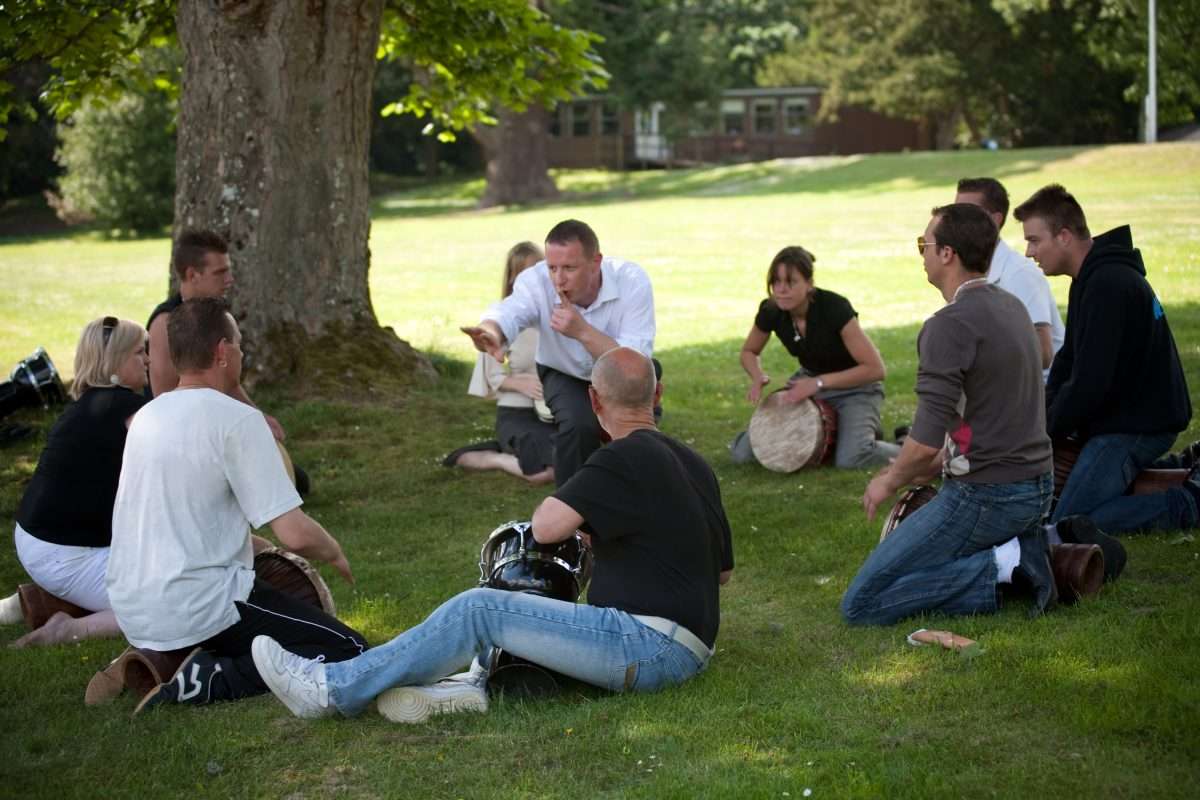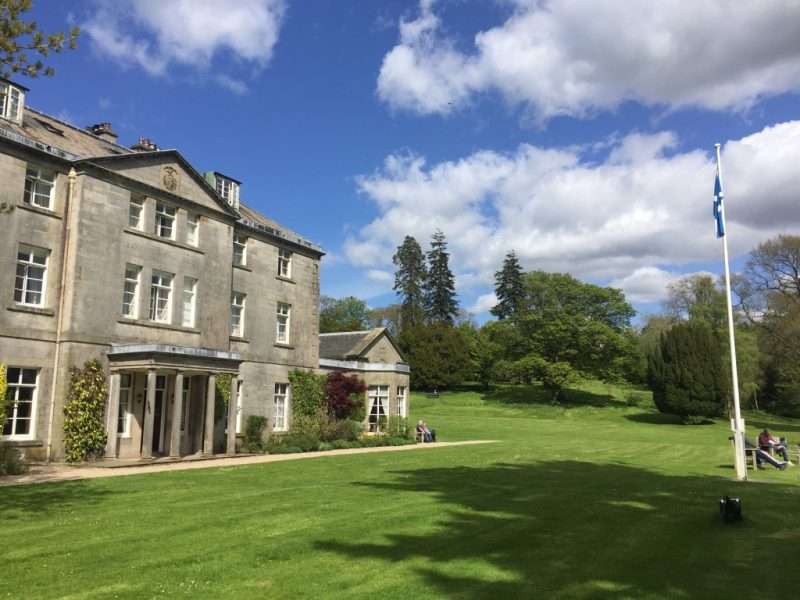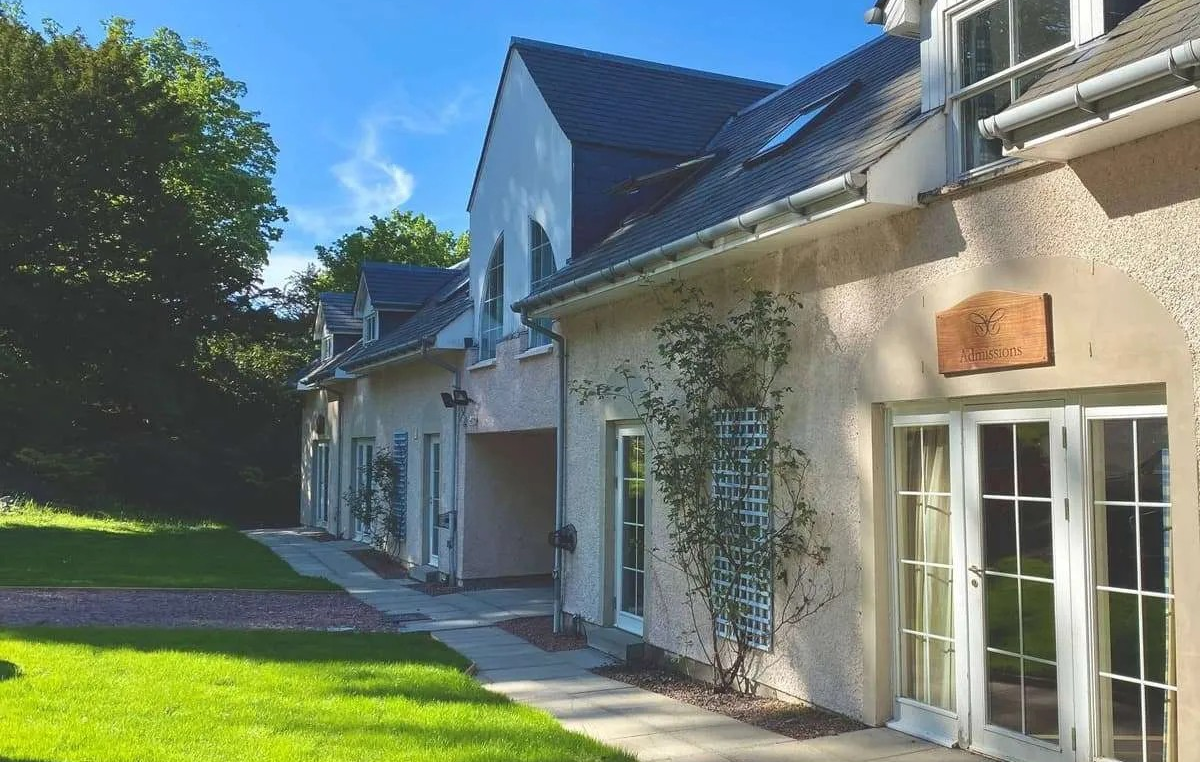
Non-12 Step Residential Treatment
Castle Craig is a family-owned, specialised rehabilitation centre in the UK for those seeking recovery from drug and alcohol addiction. Our private, woodland estate combines over 30 years of experienced care with an inspiring setting, offering the ideal environment to embrace healing and renewal. With an extensively trained team, we use tailored treatments designed to meet the unique goals and capabilities of every patient, assisting you with each and every step of your personal recovery.
Our supportive and professional rehabilitation uses expertly-led medical, therapeutic and psychiatric treatments that prioritise your well-being and long-term abstinence to the utmost. Contact us today on 01721 546 263 to learn more about our addiction treatment and how we can guide you towards a new beginning with respect and understanding.
What is a 12 Step Drug and Alcohol Recovery Programme?
A 12 Step recovery programme is a structured approach that can be used to help many individuals overcome their drug or alcohol addiction. It follows a series of guiding principles that have been designed to support personal growth and recovery. The 12 steps encourage reflection, acceptance and commitment to change, offering a clear path ahead for those seeking freedom from addictive behaviours.
12 Step programmes emphasise the importance of support from others, accountability and building meaningful connections. Participants work within a group setting to share experiences, create bonds and develop a sense of community. While its roots include faith-based components, many people adapt the programme to align with their own beliefs, making it accessible to a wide audience.
What is Non-12 Step Addiction Treatment?
Non-12 Step addiction treatments can be used as alternatives to traditional 12 Step programmes, offering personalised roads to recovery from drug and alcohol addiction battles. Different methods and therapies started to gain momentum in the late 20th century, providing those with diverse needs and beliefs with other ways to address addiction that support their individual healing goals.
Non-12 Step treatments have become increasingly popular due to their focus on adapting care plans to suit each person. At Castle Craig, we incorporate a multitude of therapies, such as cognitive behavioural therapy and mindfulness techniques, to address the specific challenges and underlying causes of alcohol, behavioural and drug addiction. Our flexible approach aims to offer trust and comfort to those seeking a customised and compassionate recovery experience.

Start Your Recovery at a Residential Rehab Today
Free Substance Addiction Assessment
Castle Craig also provides free drug and alcohol addiction assessments during our admissions process to help you take your first step towards recovery. Our experienced team is here to listen to your story, understand your situation and offer guidance on the ways you can begin to move forward. This initial assessment is a chance to explore how we can best support you in overcoming addiction.
Following the assessment, we can create a tailored residential treatment plan designed specifically for your circumstances. By listening to and addressing your needs individually, we aim to provide all the tools and support you need to start building a healthy, fulfilled life. Call us today on 01721 546 263 to find out more information about our residential treatment plans.
Key Differences Between 12 Step and Alternative Therapy Programmes
12 Step programmes are centred around group support and the application of spiritual principles to encourage recovery. They aim to provide a sense of community through shared experiences and motivate accountability within a communal setting. Alternative therapy programmes, on the other hand, often focus on personalised care and practical therapies tailored to address the individual causes and personal effects of drug and alcohol addiction.
The choice between these approaches depends on what works best for each person. Some may find comfort and motivation in the structure and community of a 12 Step programme, while others may prefer the customised, more flexible methods offered by alternative therapies. It’s important to explore both options to determine the right path for your sobriety.
Best Non-12 Step Alcohol and Drug Recovery Programmes
At Castle Craig, we understand that recovery is unique to every single person. There is no one-size-fits-all solution, which is why we create tailored treatment programmes designed to meet your individual requirements. By taking this personal approach, we want to equip you with the care and coping skills you need for long-term, sustainable recovery and a brighter future ahead.
Below, we’ve outlined some of the addiction therapy techniques that may be included as part of non-12 Step treatment programmes. These methods look deeply into the root causes of drug and alcohol addiction and can offer workable tools to help you reclaim control over your life.
-
Cognitive and Behavioural Therapies (CBT, DBT, REBT)
Cognitive and behavioural therapies such as CBT (Cognitive Behavioural Therapy), DBT (Dialectical Behaviour Therapy) and REBT (Rational Emotive Behaviour Therapy) are evidence-based treatments that focus on identifying and changing harmful thinking patterns and behaviours associated with addiction. These therapies can help people to understand the connections between their thoughts, emotions and choices.
Behavioural therapies can empower you to manage triggers effectively, improve emotional well being and develop healthier coping mechanisms. Whether through challenging beliefs, practising mindfulness or learning new skills for dealing with stress, these approaches can help build strength, peace and resilience for the future.
-
Motivational Interviewing (MI)
Motivational Interviewing (MI) is a counselling technique aimed at strengthening motivation and commitment to change. This approach hones in on understanding and addressing ambivalence about making changes, creating a safe and supportive environment where individuals feel heard and respected as they explore their goals.
Motivational interviewing can guide you to uncover your own reasons for change, creating self-confidence and a sense of empowerment. By highlighting your personal strengths and building on these, MI could help you take ownership of your recovery process, encouraging positive steps towards a healthier, more fulfilling life.
-
Trauma-Informed Therapy (EMDR, Somatic Therapy)
Trauma therapy acknowledges the connection between past trauma and addiction, recognising how traumatic experiences can impact mental health and behaviours. This approach prioritises creating a secure space where people feel understood and can begin to address the root causes of their struggles without judgement or fear.
Techniques such as EMDR (Eye Movement Desensitisation and Reprocessing) and Somatic Therapy could be offered in this process. EMDR aims to help with processing distressing memories and reducing their emotional impact, while Somatic Therapy focuses on releasing trauma stored in the body. Together, these methods can promote healing and empower you to move forward with more confidence and hope.
-
Holistic Therapies (Mindfulness, Yoga, Meditation, Breathwork)
Holistic therapies focus on the integration of mind, body and spirit to address the whole person, not just the symptoms of addiction. At Castle Craig, we incorporate both physical and emotional elements to our treatment. Our diverse range of holistic therapies can offer a comprehensive path to healing that complements other treatment strategies.
Other practices such as massage, yoga, mindfulness meditation and breathwork have also been shown to successfully reduce stress levels, improve emotional balance and enhance overall well-being. Our complementary therapies encourage self-awareness and relaxation, helping you to manage anxiety and reconnect with your personal sense of peace. Over time, these practices can also strengthen resilience, making it easier to maintain long-term recovery.
-
Contingency Management (CM) and Positive Reinforcement
Contingency Management (CM) is a type of behavioural therapy that uses rewards or incentives to encourage abstinence from harmful substances in a positive way. By providing solid recognition for maintaining sobriety or achieving specific goals, this approach can help many people to stay motivated and focused on their recovery objectives.
Positive reinforcement plays a crucial role in building motivation and practising healthy behaviours over time. It is so important to celebrate achievements, no matter how small, during addiction recovery. A supportive strategy of positive reinforcement creates a sense of progress and accomplishment that can help you develop confidence and stay encouraged on your journey.
-
Nutritional and Lifestyle Therapy (Diet, Exercise, Sleep Hygiene)
Nutritional and lifestyle therapy emphasises the importance of healthy habits in supporting the recovery process. A balanced diet provides the body with the essential nutrients needed for healing, while regular exercise boosts physical fitness and can suppress drug and alcohol cravings. Proper sleep hygiene ensures quality rest, helping the body and mind recover from the effects of addiction.
Healthy lifestyle changes have profound benefits and are an integral part of Castle Craig’s rehab treatment. By establishing a routine of healthy eating, consistent exercise and restful sleep, we encourage positive and lasting habits that improve physical health, enhance mood and increase energy levels. Call us today on 01721 546 263 to find out more about how our treatment incorporate health and nutrition.
-
Medication-Assisted Treatment (MAT) and Pharmacotherapy
Medication-Assisted Treatment (MAT) combines the use of medication with counselling and behavioural therapies to provide a comprehensive approach to treating substance use disorders. MAT is a proven tool that can help with managing withdrawal symptoms and reducing cravings, making it easier for patients to focus on their recovery.
Pharmacotherapy works to stabilise brain chemistry by addressing the physical challenges of drug or alcohol addiction. It can provide the stability needed to engage fully in therapy and develop lifelong recovery strategies. Both balanced, integrated approaches aim to lay solid groundwork for sustained healing and healthy recovery during and after rehab.
-
Fitness-Based Recovery (Strength Training, Outdoor Therapy, Adventure Therapy)
Fitness-based recovery could include physical recreation such as strength training, outdoor activities and adventure therapy to promote both mental and physical welfare. Encouraging movement and engagement in challenging but rewarding exercises can help you to channel your energy positively while improving fitness levels and overall health during the recovery process.
Fitness activities contribute significantly to long-term drug and alcohol recovery by building confidence, reducing stress and creating a sense of accomplishment. Engaging in physical challenges creates a deeper connection to both yourself and the world around you. At Castle Craig, we believe that an important part of rehab is engaging with the outdoors and breaking up intensive therapies with walks, sports, gardening or interacting with animals in our equine therapy and alpaca walking.


What Can Non-12 Step Recovery Programmes Help With?
Non-12 Step recovery treatment is designed to address a wide range of challenges, offering personalised care that goes beyond traditional approaches. They aim to treat the whole person, not just their symptoms, by focusing on individual needs and providing tailored solutions. Below, we’ve outlined some of the key areas that non-12 Step programmes can support.
- Substance Use Disorder: Through evidence-based therapies and personalised treatment plans, non-12 Step programmes help you address the root causes of addiction, develop healthier coping mechanisms and build a foundation for lasting sobriety. By focusing on the unique experiences of each individual, they can offer a personal and successful path to recovery.
- Mental Health Disorder: For those facing mental health challenges, non-12 Step programmes incorporate therapies that focus on emotional health and well-being. Techniques such as Cognitive Behavioural Therapy (CBT) or Mindfulness-Based Stress Reduction deal with issues like addiction with depression, anxiety or trauma. A therapeutic approach promotes self-awareness and can provide valuable tools to support long-term mental health.
- Dual Diagnosis and Co-Occurring Disorders: Non-12 Step recovery programmes and therapies can be effective as part of integrated treatment plans for those with dual diagnosis or co-occurring disorders. Dual diagnosis at Castle Craig aims to ensure you receive the support needed for recovery in all areas of your life, providing comprehensive care and relief from the struggles of both addiction and mental health challenges.
Many alternatives to 12 Step addiction recovery are embedded in evidence-based practices and rely on scientific research to guide their effectiveness. Approaches such as Cognitive Behavioural Therapy (CBT), Motivational Interviewing (MI) and Trauma-Informed Care have been widely studied and proven to offer support on recovery journeys.
At Castle Craig, we bring over 30 years of experience to craft treatment that truly focus on your long-term recovery. Rooted with a 12 Step foundation as well as a blend of holistic therapies, our compassionate, personalised care aims to support your unique journey with kindness, respect and trust.
Questions About Residential Rehab?
Contact us to discuss your treatment needs with a licensed clinician.
Non-12 Step Addiction Treatment During Inpatient Residential Rehab
Tailored therapy forms a vital part of Castle Craig’s residential treatment for drug and alcohol addiction recovery. Your personalised plan with us can be adapted to include any of our wide range of treatments such as medical management, mental health therapies, behavioural therapies and complementary therapies designed to address your unique challenges. We strive to make sure that you feel valued during your rehab stay with us, and always aim to offer person-centred, individual care that’s right for you.
Our holistic approach treats the whole person, and our highly experienced team works diligently to tackle not only drug and alcohol addiction, but underlying issues as well. Call 01721 546 263 today to find out more about our comprehensive care.
Non-12 Step Drug and Alcohol Addiction Recovery Programme in Scotland, UK
At Castle Craig, we understand that everyone’s path to recovery has its own story. That’s why we offer a range of evidence-based therapies structured to suit individual needs and personal circumstances. Whether you require intensive, residential care or a more flexible approach, we are here to provide the support that works best for you.

Contact Castle Craig Addiction Recovery Centre
Castle Craig’s beautiful estate is surrounded by stunning, natural landscapes, inviting you to step away from the stresses of daily life and focus entirely on your well-being.
Call our compassionate team on 01721 546 263 to ask about our evidence-based residential treatment. Together, we can explore the right recovery options for you or your loved one.
Find Us
01721 546 263
info@castlecraig.co.uk
Castle Craig,
West Linton, Edinburgh, United Kingdom, EH46 7DH
If you’re seeking an all-encompassing approach to overcoming addiction in the UK, Castle Craig can offer drug and alcohol addiction treatment specific to your individual requirements. To learn more about our residential care options, get in touch with us today. Our compassionate team is here to support and guide you towards the best treatment options for your unique needs and priorities.
-
How to Find Alternatives to 12 Step Addiction Recovery Near You
Exploring non-12 Step options for addiction recovery can feel overwhelming, but there are some effective ways to narrow down your search. Start by focusing on these key steps:
- Search for Non-12 Step Rehab Centres Online: Begin by using specific search phrases, such as “Non-12 Step rehab centres near me,” or include locations like “United Kingdom,” “Scotland,” “Edinburgh,” or “Glasgow.” This will help you find rehab centres in the UK offering alternative methods to addiction recovery.
- Find Private Rehab Centres Offering Evidence-Based Therapies: Many private centres offer approaches such as CBT, DBT, trauma therapy and holistic recovery instead of, or in addition to, the traditional 12 Step model. Addiction therapies are widely regarded as effective for both dependence and co-occurring disorders.
- Explore Holistic and Wellness-Based Recovery: Look for residential rehabs near you that incorporate mindfulness, yoga, art therapy or other wellness-focused treatments.
- Ask About Their Treatment Amenities: Facilities can vary greatly, so enquire about amenities like private rooms, complementary therapy options or on-site fitness activities. Having a comfortable environment can make a positive difference to your recovery experience.
By following these steps, you can find a drug, alcohol or behavioural recovery programme in the UK that aligns with your personal preferences and needs. Take the time to research and ask the right questions, as this could be the first step towards making an informed decision for long-term healing.
Free Addiction and Mental Health Assessments at Castle Craig
At Castle Craig, we provide free addiction and mental health assessments to help you take your first step toward recovery. Our goal is to understand your situation and offer professional guidance in a safe, non-judgemental environment.
With your assessment, we can create a tailored treatment plan designed to meet your specific needs. By focusing on what works best for you, our personalised approach can offer you the tools and strategies to change your future, one step at a time. Contact us on 01721 546 263 to begin your journey today.
Free Addiction Assessment
Taking the first step and asking for help can feel daunting, but our team is here to assist you.
How Long Do Non-12 Step Recovery Programmes last?
The length of non-12 Step recovery programmes can vary widely depending on what the participant requires and the type of programme. Options such as inpatient, outpatient or day treatment programmes all provide varying levels of intensity, meaning timelines can range from a few weeks to several months.
The best way to determine the right duration for your recovery with us is to contact our professional staff. Our team can offer expert advice and help guide you to the right treatment based on your circumstances and initial assessment. Below is a general guide to help explain some of the different timeframes that could be involved.
-
Short-Term Programmes (30 to 90 Days)
Short-term rehab programmes typically run for 30, 60 or 90 days in UK residential or outpatient settings. During this time, you have the chance to engage in intensive therapies and treatments specific to your needs. Activities like group sessions, individual counselling and building coping mechanisms are key elements in this time-sensitive recovery approach.
The structured schedule within these programmes allows you to form a solid foundation for recovery. By immersing yourself in a supportive environment, you may be better equipped to learn essential skills that promote abstinence and prepare you for the next stage of your personal recovery journey.
-
Long-Term Programmes (3 to 12 Months)
For some, longer-term programmes that span from three months to a year could offer a more comprehensive approach to recovery. These programmes allow patients to spend an extended period developing healthier patterns of behaviour while addressing underlying causes of drug or alcohol addiction. Techniques such as cognitive therapies and skill-building interventions play a key role in this phase.
During this time, you can focus on relapse prevention, repairing personal relationships and exploring the deeper aspects of your mental and physical health. Having this extended rehab period can create a sense of stability while encouraging further growth and accountability.
-
Ongoing Outpatient and Aftercare (Flexible Duration)
Recovery is a deeply personal and ongoing process that often extends far beyond initial treatment. Many individuals in non-12 Step programmes choose to incorporate outpatient and aftercare services into their lives to sustain sobriety after drug and alcohol rehab. Both outpatient and aftercare programmes are designed to be flexible, tailoring support to suit your needs and schedule over time. Whether it’s attending regular one-on-one counselling or participating in group therapy, the focus remains on equipping you with tools to manage life’s challenges while staying grounded in your recovery path.
Long-term commitment to recovery often requires enriching your experience through meaningful actions. Service work, such as mentoring others who are new to recovery, can be incredibly empowering. It can build a sense of purpose while reinforcing your own progress. Engaging in holistic recovery traditions, which may include sharing personal experiences or building a supportive community, can also cultivate a strong foundation for lasting change. At Castle Craig, we know that recovery is not just about living free of substance use — it’s about thriving in a fulfilling and connected life.
Does Private Health Insurance Cover Alternatives to Twelve Step Recovery?
Health insurance coverage for alternatives to 12 Step recovery programmes in the UK will vary based on your policy and provider. It’s important to review your plan details or contact your insurer to better understand what might be included for you.
Castle Craig accepts private health insurance from many major companies and, if you are approved for treatment at our centre by your provider, we can assist you by explaining more about the rehabilitation options they have authorised you for – our team is here seven days a week to help guide you through the admissions process.

Contact Castle Craig Today
Take the first step towards recovery by reaching out to Castle Craig. We’re committed to valuing and supporting you every step of the way.
Call us today on 01721 546 263 to start your recovery journey. Alternatively, you can fill out our online form to get in touch. We’re here to help you take the important next steps towards your new future goals.
How Much Does a Comprehensive Non-12 Step Rehab Programme Cost?
Non-12 Step rehab programmes in the UK generally cost between £650 and £1,500 per day, depending on the level of treatment and care provided as a whole. For a 30-day residential course of both medical and non-12 step addiction treatment options, this equates to a range of approximately £18,000 to £40,000+ for high-end, comprehensive rehabs. These services often include intensive therapies, holistic recovery options and professional support tailored to each individual.
The exact costs can vary widely based on your personal circumstances and the type of programme you select. Factors such as outpatient versus residential settings, the inclusion of medically managed detox and the duration of treatment all contribute to the cost of non-12 Step recovery. To get a more detailed understanding of the options available at our facility, fill out our online form to contact Castle Craig and we can give you accurate information.
Non-12 Step for Alcohol and Drug Addiction Recovery Admissions Process
Our admissions process for both 12 Step and non-12 Step recovery is designed to identify the unique needs of each person that we welcome. At Castle Craig, we deeply understand that everyone’s path to recovery is different, so we work closely with you to deliver treatment tailored to your specific circumstances and goals for the future.
- Initial Enquiry and Consultation: Your recovery starts with a simple enquiry. During this initial stage, our team will listen to your concerns and answer any questions you may have about the process. We aim to provide clarity and reassurance while gathering a preliminary understanding of your situation.
- Pre-Admission Assessment: The next step involves a thorough assessment of your medical history, substance addiction challenges and personal circumstances. This allows us to determine the most effective course of action and ensure that all necessary resources are in place for your arrival.
- Choosing the Right Programme: Based on the pre-admission assessment, we help you select the treatment that is the best match for you, whether that’s inpatient care, outpatient support or a combination of therapies tailored to your recovery goals.
- Detox and Medical Support (If Required): If detoxification is necessary, it will be conducted under professional guidance to ensure your safety and comfort. Our medical team offers round-the-clock care to manage withdrawal symptoms and provide the support you need throughout.
- Admission and Treatment Start: Upon admission, you’ll be warmly welcomed into our compassionate and supportive environment. A personalised treatment plan will be put into action for you, incorporating evidence-based therapies to guide you through each stage of recovery.
- Ongoing Support and Aftercare Planning: Recovery doesn’t end when your rehab does. As an integral part of the process, we develop an aftercare plan tailored to help you maintain your progress. This could include ongoing therapy, community support groups or wellness activities to secure.
By breaking down our admissions process into clear and supportive steps, we aim to make your transition into treatment as smooth and reassuring as possible. Reach out to our friendly admissions team to start your journey today.

Contact Castle Craig Today
Take the first move towards recovery by getting in touch with Castle Craig. Our team is here to guide you through our addiction rehab treatment, explain the admissions process and help you book a free addiction assessment. We are dedicated to providing the care and support you need to start your journey to a renewed, addiction-free life.
For more information, call us today on 01721 546 263. Alternatively, you can complete our online form. Reaching out could be the life-changing decision you’ve been waiting to make, and we’re ready to listen 7 days a week.
Free & Confidential Assessment
Compassion, expertly delivered evidence-based practices and a patient-centred approach are at the heart of our treatment model. Request a call-back from one of our professionals on any day of the week.
-
Statistics on Evidence-Based Addiction Therapies
- 91.8% of 158 respondents who completed treatment at Castle Craig were either living with reduced alcohol or drug use or abstinent.
- The National Drug Treatment Monitoring System (NDTMS) reported a steady recovery rate for individuals involved in residential rehab programmes in the last two years, proving the efficacy of structured care.
- Personalised programmes in private rehabs like Castle Craig reduce relapse risks significantly by addressing individual challenges with tailored solutions.
- A study by KCL reported higher satisfaction rates among patients attending private residential rehab versus community-led programmes.
- Private rehab programmes provide a greater focus on family therapy, enhancing long-term recovery by addressing interpersonal dynamics.